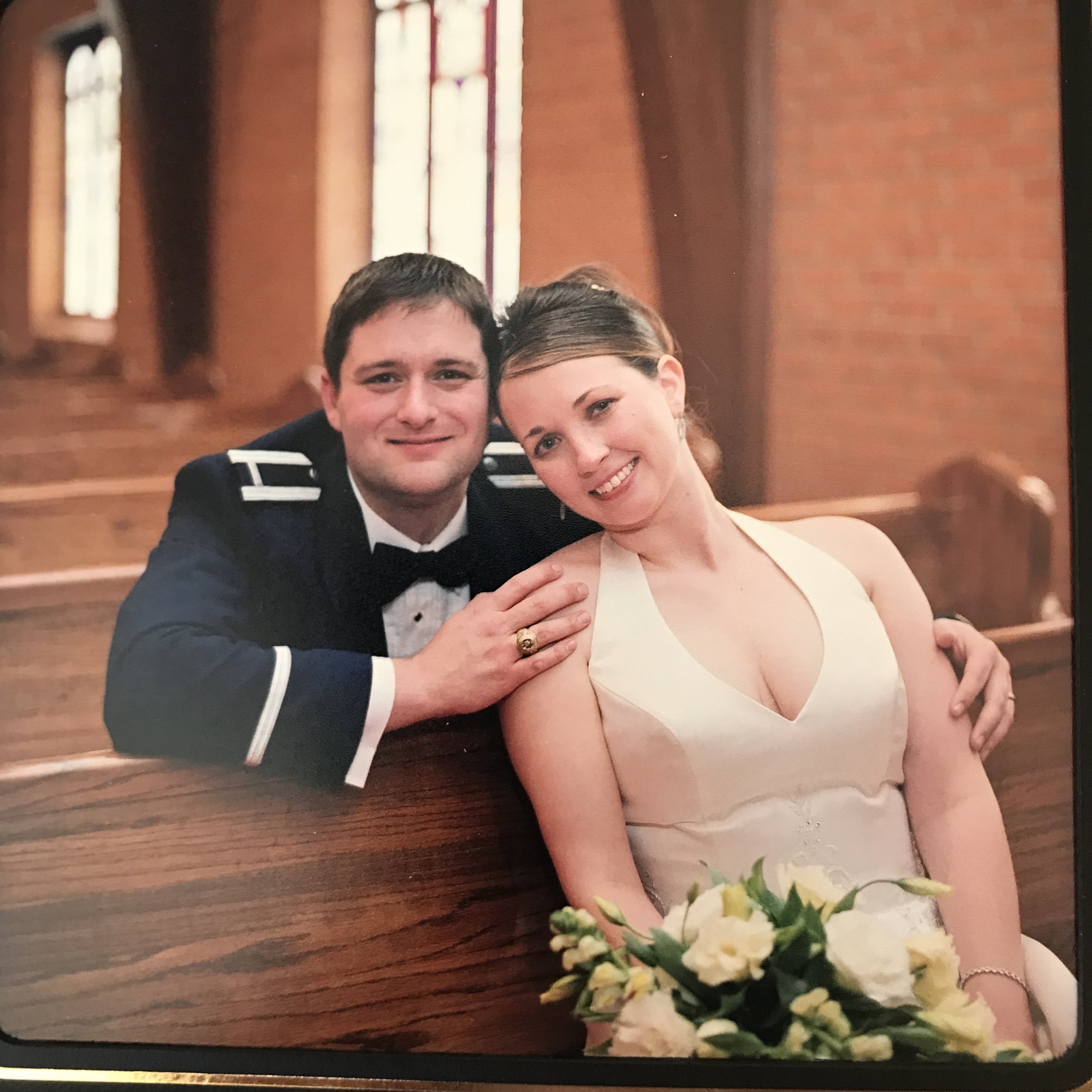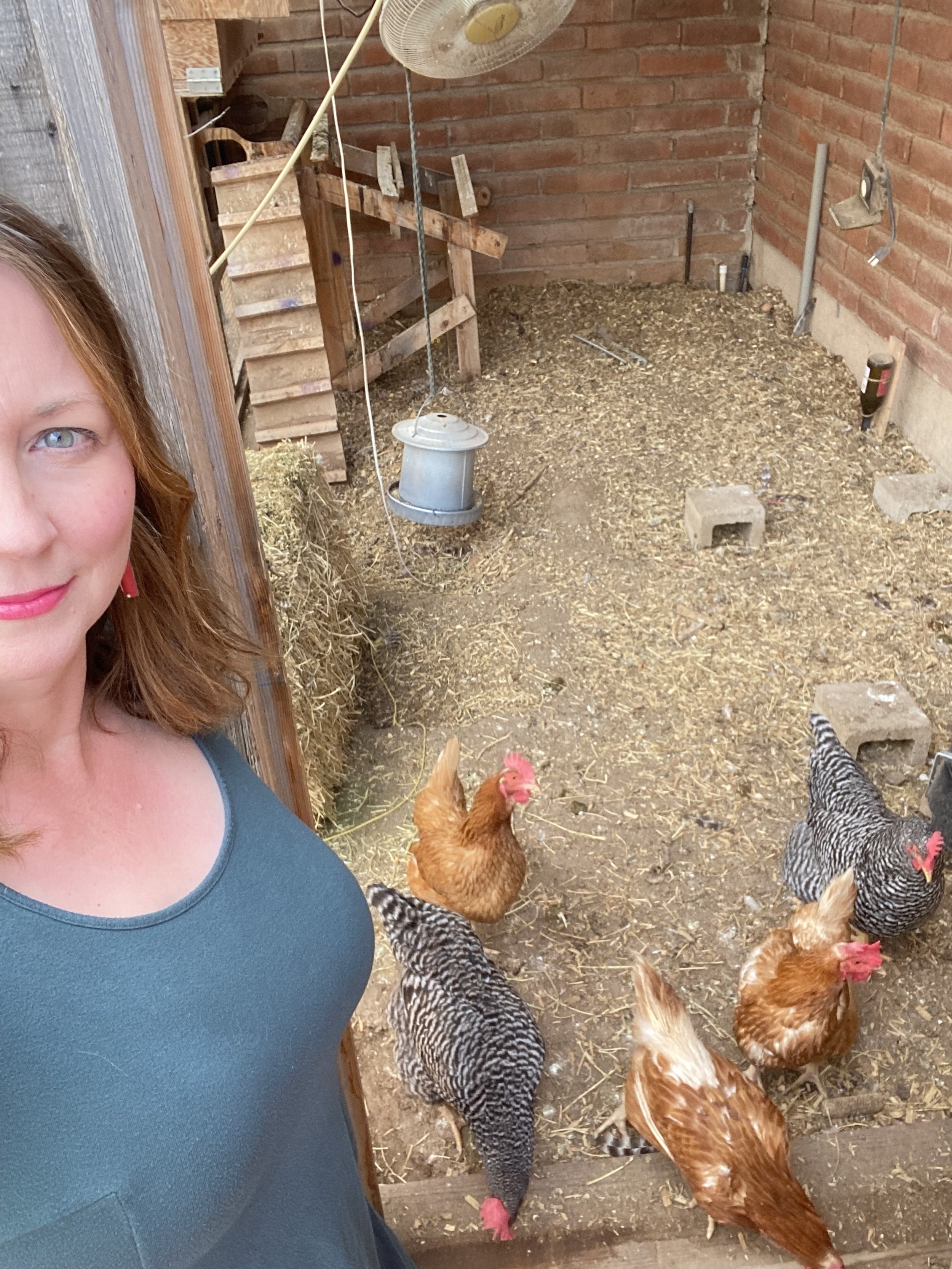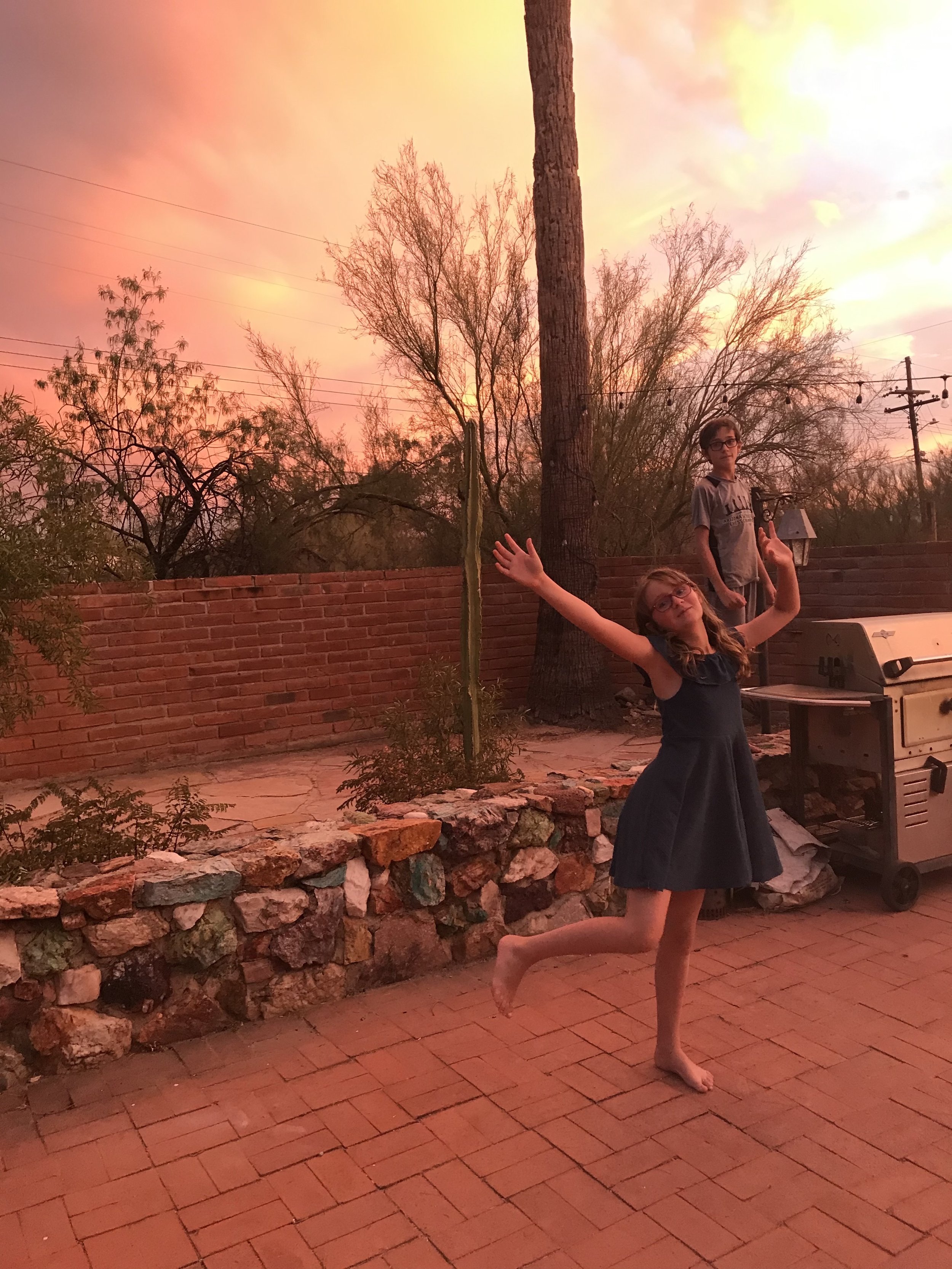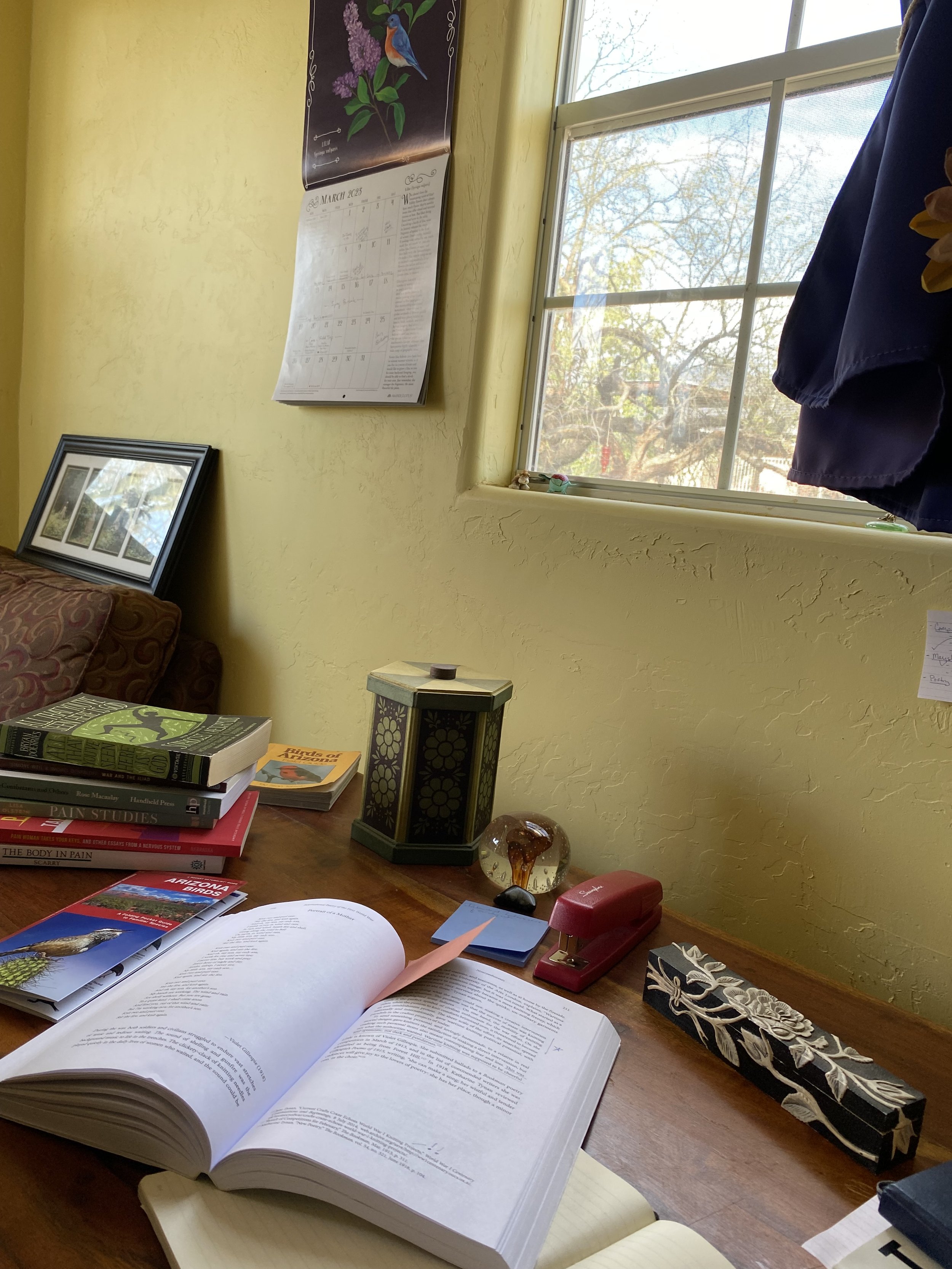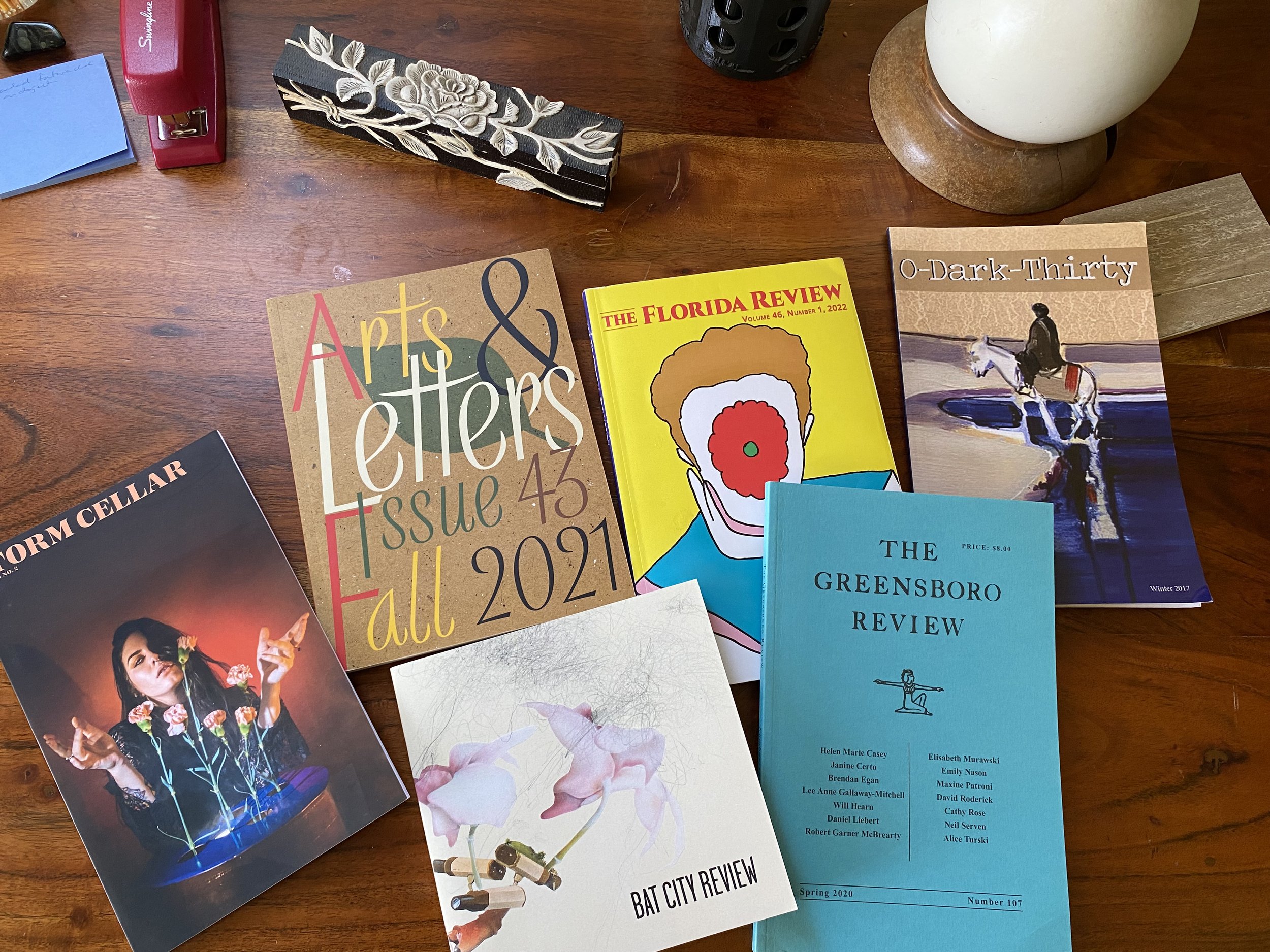An Interview with Lee Anne Gallaway-Mitchell
There is always more to learn and explore, especially when life sends us down unexpected journeys. Milspouse/writer/teacher/caregiver Lee Anne Galloway-Mitchell shares how PCSing, parenthood, Covid, and all sorts of life events can sometimes put a project on hold, but can also bring about new creative adventures.
MilspoFAN: Tell us a little about yourself, your journey as a military spouse, and where you are today.
Lee Anne: My husband and I have known each other most of our lives. We both grew up in a small farming community north of Lubbock, Texas. Both of us grew up working on our families’ farms. Somehow, in our mid-twenties, while visiting our families for Christmas, something sparked between us. He was in pilot training at Sheppard AFB in Wichita Falls, Texas. I was a graduate student in English literature at the University of Texas. We have been together 20 years. We were married right before his first deployment. He has been active duty and reserves as well as those weird in-betweens of AGR and ART in addition to flying for a commercial airline. He took leave from the commercial airline and returned to active duty so I could go back and get my MFA and he could be around more to help with the kids, house, and pets. Now, he is AGR here in Tucson where he just finished three very challenging years of command during COVID. He is now finishing out his time before returning to fly commercial. We like Tucson, so we will be here for the time being or at least until our kids finish school. We have two children, Gus and Cora. We also have a few chickens and a golden retriever puppy named Josie. A family of Cooper’s hawks live in our towering pine tree. We have over a dozen saguaros that host cactus wren, and we are overrun by countless coveys of Gambel’s quail.
MilspoFAN: How did you become a writer?
Lee Anne: I started writing stories when I was about seven or eight. Mostly, they were murder mysteries. As much as I knew I wanted to be a writer, I didn’t start out studying writing or English in college. I was a first-generation college student, so I felt I had to do something like be a psychologist or go to med school. BUT, I just kept taking English classes, and I spent most of my twenties in graduate school getting a masters and then a PhD in English from the University of Texas. So my writing was primarily academic and research-driven. After having kids, I didn’t really write for about five years. Then, I went back for my MFA at the University of Arizona when I was almost forty. Now I am 45 with a growing list of publications, and I’m hoping I can get a book in before I turn 50.
I have many research interests and I am always reading multiple books at once. I write mostly on a computer, but I use a journal to brainstorm and take notes.
MilspoFAN: Describe for us your creative process and how that influences what you write?
Lee Anne: I work around and in between interruptions, so my work is often fragmented at first. I am a slow writer, and I’ve learned to be at peace with the fact that my current project could take a few more years. I have made nurturing and caring for kids, plants, and animals part of my process (even though right now I could really use a break from caregiving). If I am stuck, I fill the bird feeder or gather eggs, weed or water the plants. I play with the dog. I check in on my son or daughter. As a result, much of what I write is about care work and about the importance of care itself and juxtapose all that care against narratives of war, violence, and chronic illness.
Part of my process is taking scissors to what I have written and then rearrange them. This is one way I do it.
MilspoFAN: We read that you are working on a memoir-in-essays called Campfollowers. Can you tell us about your experience working on this piece and what it has meant to you and your relationship with family and military life?
Lee Anne: I started this project about six years ago when I started writing again, but I had been thinking about it for quite some time before that. Campfollowers is about life organized around the protocols of threat and disaster preparedness. I look at life lived in the aftermath of armed conflict and amid it. I also do some weird hybrid stuff with poetry in which I give voice to different campfollowers (military spouses) throughout history. Much of it documents mental illness in military families and the difficulties in getting treatment as well as my parents’ struggle with the VA to have my dad’s illness recognized. I have struggled for much of my life with depression and anxiety, and I found that the challenge of finding care while not affecting my husband’s career to be the biggest obstacle in managing my illness. What does care look like? How do systems create the conditions for failures of care? How does the military actively discourage military families from seeking care for mental health issues even as they promote—on the surface at least—seeking treatment?
This small shed is where I work. After years of moving and never having a space to myself, I finally have room to write.
Some days I wake up and this book is a memoir-in-essays and other hybrid literary forms. Other days, it’s straight up memoir with a bonus in-progress poetry manuscript. As I write these words, I realize that process is kind of how military life works, too.
MilspoFAN: How has your role as a military spouse impacted your work as a writer- creatively, logistically, or otherwise?
Lee Anne: Creatively, I have always been a writer obsessed with place, and for a long time, I wrote about Texas. Sometimes I still do. On paper, military families can vote, pay taxes, and all that stuff in their home state while living in another. But, when my husband joined the reserves, we became Arizona residents, and I started to write about place differently. Also, being a military spouse put my own childhood in perspective. I’m the daughter of a Vietnam veteran who had service-related illnesses and disabilities. He died in 2018. I had not realized how much his military service— which ended before I was born—shaped almost every aspect of my life. As a military spouse, I realized that my family of origin was a military family, a “post service” military family. This seemingly obvious realization informs much of my work now.
Logistically, I knew as I was defending my dissertation back in 2008 while three months pregnant with a deployed husband that I wasn’t going to be a tenure track professor. Pilots move and deploy often in the first ten years or so of their careers. Mostly, I taught freshman composition here and there, but I was always thinking about writing. I read widely, took notes, and followed research obsessions. I dove deep into my family history. I didn’t write anything for five years, but I was thinking and pre-writing. I didn’t know it then, but I was developing my artistic practice.
Here are a few journals where my writing appears.
MilspoFAN: How do you cultivate your creativity?
Lee Anne: I seek out other art forms! I love music, theatre, and film. I appreciate good food. I have friends who work in visual arts, and I learn so much about process from them. I also walk and meditate and garden. I find that movement and breath are vital to my daily functioning.
MilspoFAN: How do you meet other artists or plug into the local arts scene when you PCS?
Lee Anne: I didn’t have many connections to other writers and artists while we were actively PCSing until we moved to Tucson and started to put down roots, to be honest. But, if we had to move again, the first thing I would do is look for classes, workshops, readings, and other writers connected to a university in nearby cities. I am lucky here in Tucson to live in a thriving arts community. If I had to do the PCS life again, I would look for artists working in all modalities—photographers, woodworkers, illustrators, whatever. “What is your creative practice?” would be my friend pick-up line during a PCS.
MilspoFAN: What’s next for you?
Lee Anne: I am working on my manuscript and on a few other projects. I try to dedicate time to my art every single day, and as things transition for my family and as the kids get older, I have to adjust my artistic practice. I have an essay about Texas identity and gun violence coming out this year or early next. I have a poem coming out in an anthology on climate change. When I get stuck on my memoir project, I cheat on it with a weird speculative novel I’m writing based on strange happenings reported in rural West Texas newspapers from the 1890s. It’s fun and super low stakes and could be something, eventually. I just try to stay open to possibilities, which means I have several projects going on at once!
MilspoFAN: What is the most practical piece of advice that you would give to other artists?
Lee Anne: Get to know artists working in other modalities/genres outside of your own.. There is always a potential for collaboration. One of my best friendships is with a glass sculptor/artist who also writes as part of her process. We push each other and help each other see our work in new and unexpected ways.


